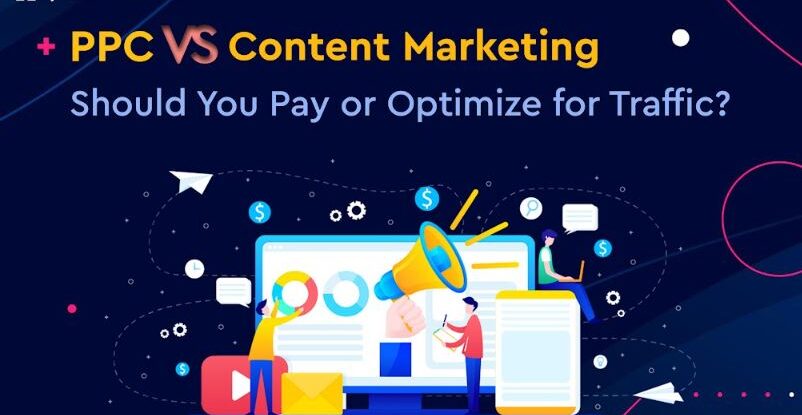Introduction
In the dynamic realm of digital marketing, businesses are often faced with the strategic decision of choosing between two powerful approaches: Content Marketing and Pay-Per-Click (PPC) advertising. Each avenue holds distinct advantages, and the choice between them hinges on various factors such as goals, budget, and target audience. In this blog post, we embark on a journey to unravel the intricacies of Content Marketing and PPC, seeking to answer the burning question: Which makes more progress for your business?
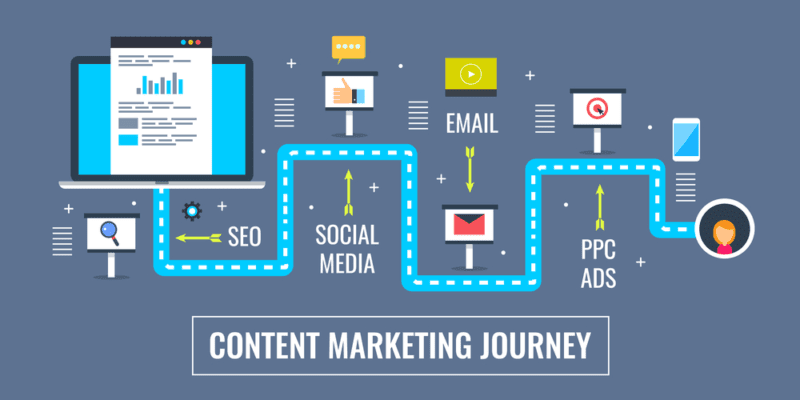
Content marketing
content marketing is a strategic marketing approach that focuses on creating, publishing, and promoting valuable, relevant, and consistent content to attract and retain a clearly defined audience and drive profitable customer action.
In other words, content marketing is about using content to build relationships with your target audience and achieve your business goals. This can be done by providing informative and engaging content that helps your audience learn, solve problems, and make decisions.
Content marketing can take many different forms, such as blog posts, articles, videos, infographics, ebooks, and social media posts. It can be shared across a variety of platforms, such as your website, social media, email, and paid advertising.
Effective content marketing is not about selling products or services directly. Instead, it is about building trust and credibility with your audience by providing them with valuable information. When you do this, your audience will be more likely to think of you when they are ready to buy.
Here are some examples of content marketing:
- A software company publishes a blog post about how to choose the right CRM software for your business.
- A marketing agency creates an infographic on the latest social media trends.
- An e-commerce company produces a video tutorial on how to assemble a piece of furniture.
- A restaurant publishes a newsletter with recipes, cooking tips, and information about upcoming events.
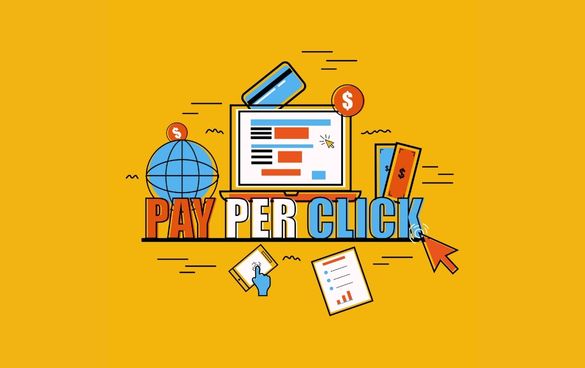
What Is Pay-Per-Click Advertising?
it is a type of online advertising where businesses pay advertisers each time someone clicks on one of their ads. PPC ads are often displayed at the top of search engine results pages (SERPs), and they can be a very effective way to reach potential customers who are already interested in what you have to offer.
One of the biggest benefits of PPC is that you only pay when someone clicks on your ad. This means that you’re not wasting money on ads that people aren’t seeing or clicking on. Additionally, PPC allows you to target your ads to specific keywords and demographics, so you can reach the people who are most likely to be interested in your products or services.
PPC can be a great way to increase traffic to your website, generate leads, and boost sales. However, it’s important to set a budget and track your results carefully to make sure that you’re getting a good return on your investment.
PPC advertising is a way to pay for ads that appear at the top of search results. You only pay when someone clicks on your ad, which makes it a cost-effective way to reach potential customers.
Understanding the Advantages and Limitations of Content Marketing
Content marketing is a more cost-effective and long-term marketing strategy than PPC because it does not require you to pay for each click. Instead, you invest in creating high-quality content that will attract and engage your target audience over time. This can lead to a number of benefits, including:
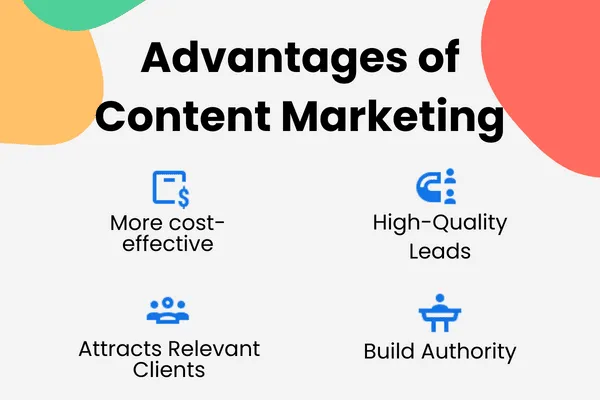
The Pros
- More qualified leads: Content marketing helps you attract visitors to your website who are already interested in what you have to offer. This is because you are creating content that is relevant to their needs and pain points. As a result, these visitors are more likely to become qualified leads who are serious about buying from you.
- More relevant clients: Content marketing allows you to target your content to specific demographics and interests. This means that you can attract visitors to your website who are more likely to become relevant clients. For example, if you are a software company, you can create content that targets businesses of a certain size or industry.
- Increased brand authority: Content marketing helps you establish your business as a thought leader in your industry. This is because you are regularly providing your audience with valuable information and insights. As a result, potential customers will see you as a trusted source of information and be more likely to do business with you.
In addition to these benefits, content marketing can also help you to:
- Improve your website’s SEO ranking: High-quality content is one of the most important factors in search engine optimization (SEO). By creating and publishing high-quality content on a regular basis, you can improve your website’s ranking in search engine results pages (SERPs). This will make your website more visible to potential customers who are searching for products or services like yours.
- Generate more leads and sales: Content marketing can help you to generate more leads and sales by nurturing your audience through the sales funnel. By providing your audience with valuable content at every stage of the sales funnel, you can keep them engaged and moving towards a purchase.
Overall, content marketing is a powerful and versatile marketing strategy that can help you to achieve a variety of business goals. It is a more cost-effective and long-term strategy than PPC, and it can help you to attract more qualified leads, more relevant clients, and increase your brand authority.
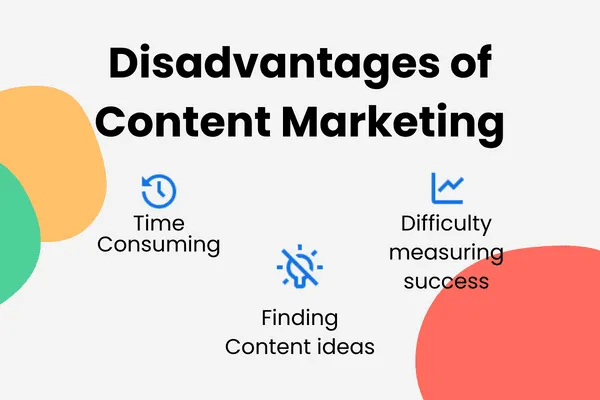
The Cons
One of the biggest downsides of content marketing is that it can be very time-consuming. Creating high-quality content requires a significant investment of time and effort, from research and writing to editing and promotion. Additionally, it can take time to see results from content marketing efforts. It may be several months or even years before you start to see a significant increase in traffic, leads, or sales.
Another downside of content marketing is that it can be difficult to measure its success. It can be challenging to track the ROI of content marketing efforts, especially because content marketing often has long-term benefits. However, there are a number of metrics that you can track to measure the success of your content marketing campaigns, such as website traffic, leads generated, and social media engagement.
Finally, coming up with fresh and engaging content ideas can be challenging, especially if you are producing content on a regular basis. It is important to keep your target audience in mind when brainstorming content ideas, and to focus on creating content that is informative, valuable, and relevant to their needs.
Despite these challenges, content marketing is a powerful and effective marketing strategy that can help businesses of all sizes to achieve their marketing goals. By investing in content marketing, businesses can build stronger relationships with their target audience, generate more leads and conversions, and ultimately drive more revenue for their business.
Pros and Cons of Pay-Per-Click Advertising
When deciding whether pay-per-click (PPC) advertising is the right marketing strategy for your business, it’s important to consider both the benefits and potential downsides.
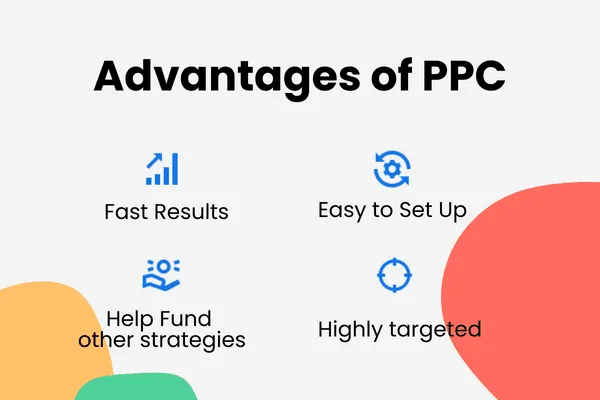
pros of pay-per-click (PPC) advertising
Fast results: PPC advertising can generate results very quickly. Once you create and launch your ad campaigns, your ads can start appearing at the top of search engine results pages (SERPs) within hours. This can be a great way to get your business in front of potential customers who are already actively searching for products or services like yours.
Easy to set up: PPC platforms, such as Google Ads, are relatively easy to navigate and set up. This means that you can get your ad campaigns up and running quickly, even if you don’t have a lot of experience with online advertising.
Instant return on investment (ROI): PPC advertising can generate instant ROI, which can be used to fund other marketing strategies. For example, you can use the profits from your PPC campaigns to invest in content marketing, social media marketing, or other long-term marketing strategies.
Highly targeted: PPC advertising allows you to target your ads to specific audiences using a variety of targeting options, such as target keywords, demographics, interests, and location. This means that you can reach the people who are most likely to be interested in what you have to offer, which can lead to better results and a higher ROI.
In addition to these benefits, PPC advertising can also help you to:
- Increase brand awareness: By having your ads appear at the top of SERPs, you can increase brand awareness and visibility among potential customers.
- Drive traffic to your website: PPC advertising can help you to drive more traffic to your website, which can lead to more leads and sales.
- Improve your website’s SEO ranking: PPC advertising can help to improve your website’s SEO ranking over time. This is because PPC advertising can help you to generate more traffic to your website and improve the click-through rate (CTR) of your organic search results.
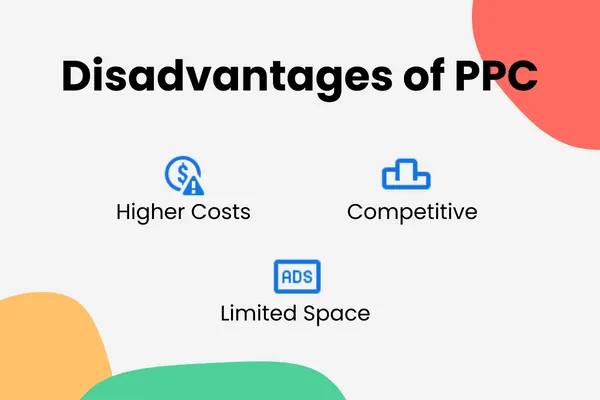
The Cons
Higher costs: PPC advertising can be more expensive than other marketing strategies, such as content marketing or social media marketing. This is because you need to continuously invest in your PPC campaigns to maintain top positions in search engine results pages (SERPs). The cost per click (CPC) for certain keywords can also be very high, especially in competitive industries.
Competitive: PPC can be very competitive, especially in certain industries. This is because many businesses are bidding on the same keywords, which can drive up the CPC. This can make it difficult and expensive to achieve good results with PPC advertising.
Limited space: PPC ads have limited space for headlines and descriptions. This can be a disadvantage if you have a lot of information that you want to communicate in your ad. It is important to carefully craft your PPC ad headlines and descriptions to make sure that they are clear, concise, and persuasive.
In addition to these cons, PPC advertising can also be:
- Time-consuming: It can take time to create and manage effective PPC campaigns. You need to regularly review your campaigns and make adjustments as needed to improve your results.
- Complex: PPC advertising can be complex, especially for beginners. There are a lot of different factors to consider, such as keyword targeting, bidding strategies, and ad copy. It is important to have a good understanding of PPC advertising before you start running your own campaigns.
Overall, PPC advertising is a powerful marketing tool, but it is important to be aware of the cons before you start running your own campaigns. PPC can be expensive, competitive, and time-consuming. It is important to have a good understanding of PPC advertising before you start running your own campaigns and to carefully track your results to ensure that you are getting a good ROI.
Here are some tips for reducing the costs of PPC advertising:
- Target long-tail keywords: Long-tail keywords are more specific and less competitive than short-tail keywords. This means that you can often get lower CPCs for long-tail keywords.
- Use negative keywords: Negative keywords allow you to exclude certain keywords from your campaigns. This can help to reduce your costs by preventing your ads from showing for irrelevant searches.
- Set a budget: It is important to set a budget for your PPC campaigns so that you don’t overspend. You can also use daily and monthly budget limits to control your spending.
- Track your results: It is important to track your PPC results carefully so that you can see what is working and what is not. This will help you to make adjustments to your campaigns as needed to improve your results.
Sponsored Content Marketing vs. Pay-Per-Click Advertising
The cost of paid search vs. paid social can vary greatly. So it’s important to consider the specific needs of your business and target audience when deciding which strategy to use.
Sponsored Content Marketing
Sponsored content marketing is a type of marketing where businesses pay to have their content promoted on third-party websites, such as blog posts, social media posts, or videos. This can be a very effective way to reach a wider audience and build brand awareness.
The cost of sponsored content marketing can vary depending on a number of factors, including:
- The website or platform used: Some websites and platforms are more expensive than others. For example, it will typically cost more to place sponsored content on a high-traffic website with a large and engaged audience.
- The target audience’s size: The larger the target audience, the more expensive it will be to reach them. This is because businesses need to pay more to have their content promoted to a larger number of people.
- The level of customization required: If a business wants to have their content customized to a specific audience or topic, this will also increase the cost.
Overall, the cost of sponsored content marketing can range from a few hundred dollars to several thousand dollars, depending on the factors listed above. However, it is important to note that sponsored content marketing can be a very effective way to reach a wider audience and build brand awareness.
Here are some tips for getting the most out of sponsored content marketing:
- Choose the right platforms: Not all platforms are created equal. When choosing where to place your sponsored content, it is important to consider your target audience and the types of content they consume.
- Create high-quality content: Your sponsored content should be informative, engaging, and relevant to your target audience. If it is not, it is unlikely to be effective.
- Promote your content: Once your sponsored content is published, it is important to promote it on social media and other channels to reach a wider audience.
- Track your results: It is important to track the results of your sponsored content campaigns so that you can see what is working and what is not. This will help you to make adjustments to your campaigns as needed.
PPC Advertising
Paid marketing campaigns through Google Ads, Facebook, or Instagram are a smart way to control your budget. One of the key advantages of PPC advertising is that you can set daily spending limits. This means that you can experiment with different ads, visuals, and strategies at your own pace, without having to worry about overspending.
Here are some of the benefits of setting a daily budget for your paid marketing campaigns:
- You can control your spending: This is especially important if you are new to PPC advertising. By setting a daily budget, you can avoid spending more than you can afford.
- You can experiment with different strategies: As you learn more about PPC advertising, you can experiment with different ad campaigns, targeting options, and bidding strategies. Setting a daily budget allows you to do this without having to worry about overspending.
- You can optimize your campaigns: Once you have some data from your PPC campaigns, you can start to optimize them for better results. This may involve adjusting your budget, targeting options, or bidding strategies. Setting a daily budget gives you the flexibility to do this without having to worry about overspending.
To set a daily budget for your paid marketing campaigns, follow these steps:
- Go to your Google Ads, Facebook Ads, or Instagram Ads account.
- Click on the “Settings” tab.
- Under “Budget,” set your daily budget.
- Click “Save.”
Once you have set a daily budget, your ad campaigns will not spend more than that amount in a day. This means that you can confidently experiment with different strategies and optimize your campaigns without having to worry about overspending.
Here are some tips for getting the most out of your paid marketing campaigns:
- Set clear goals: What do you want to achieve with your paid marketing campaigns? Do you want to increase brand awareness, generate leads, or drive sales? Once you know your goals, you can tailor your campaigns accordingly.
- Target your audience: Who are you trying to reach with your paid marketing campaigns? Once you know your target audience, you can target your ads to them more effectively.
- Create compelling ads: Your ads should be clear, concise, and persuasive. They should also be relevant to your target audience and the keywords they are searching for.
- Track your results: It is important to track the results of your paid marketing campaigns so that you can see what is working and what is not. This will help you to make adjustments to your campaigns as needed.
By following these tips, you can use paid marketing campaigns to reach your target audience, achieve your marketing goals, and control your budget.
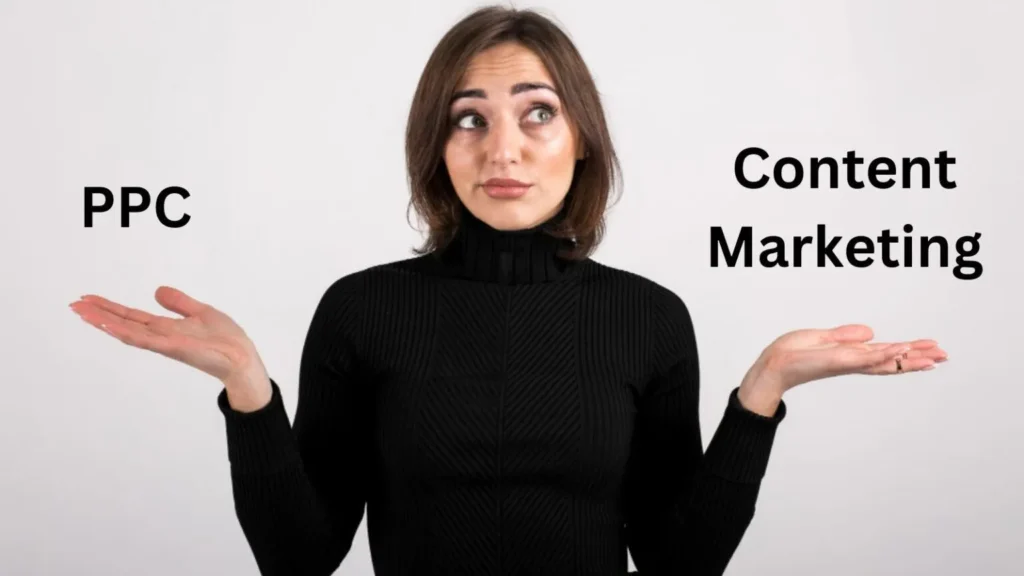
Deciding Between PPC vs Branded Content Marketing: Which is Right for Your Business?
most effective approach is to use PPC and content marketing strategies together. PPC can drive immediate results, while content marketing can build long-term relationships with your target audience.
Here are some of the benefits of using PPC and content marketing together:
- Reach your target audience on different levels: PPC advertising allows you to target your audience based on their search terms, demographics, and interests. This means that you can reach people who are already interested in what you have to offer. Content marketing, on the other hand, allows you to reach your audience through different channels, such as your blog, social media, and email. This means that you can reach people who are not yet aware of your brand or products/services.
- Target different stages of the customer journey: PPC advertising is a great way to target people who are already at the bottom of the sales funnel, meaning they are ready to buy. Content marketing, on the other hand, is a great way to target people who are at the top or middle of the sales funnel, meaning they are still learning about their needs and options.
- Build long-term relationships: PPC advertising is a great way to generate short-term results, but it is not a long-term solution. If you stop running PPC ads, your traffic will stop. Content marketing, on the other hand, is a long-term strategy. By creating and publishing high-quality content, you can build relationships with your audience and attract them to your website over time.
Here is an example of how you could use PPC and content marketing together:
- A software company could use PPC advertising to target people who are searching for keywords like “best CRM software.”
- The company could also create blog posts and articles about CRM software, such as “How to choose the right CRM software for your business” and “10 benefits of using a CRM system.”
- The company could also create a free ebook or whitepaper about CRM software, which they could offer in exchange for contact information.
By using PPC and content marketing together, the company could reach a wider audience and build relationships with potential customers. This would lead to more leads and sales for the company.
Overall, the best way to decide which marketing strategy is right for you is to consider your budget, goals, and target audience. If you are looking for short-term results, PPC advertising is a good option. If you are looking for long-term results, content marketing is a good option. However, the best results come from using PPC and content marketing together.
PPC and content marketing are two powerful digital marketing strategies that can be very effective when used together. By combining both strategies, businesses can reach a wider audience, generate more leads and sales, and build stronger relationships with their customers.
Here are some of the benefits of combining PPC and content marketing:
- Reach a wider audience: PPC advertising allows you to target your ads to people who are already searching for keywords related to your business. Content marketing, on the other hand, allows you to reach people who may not be aware of your business but who are interested in the topics you write about. By combining both strategies, you can reach a wider audience and increase your chances of converting leads into customers.
- Generate more leads and sales: PPC advertising can be a great way to generate quick leads and sales. However, it can be expensive over the long term. Content marketing, on the other hand, is a more cost-effective way to generate leads and sales over time. By combining both strategies, you can generate leads and sales more efficiently and effectively.
- Build stronger relationships with customers: Content marketing is a great way to build relationships with your customers by providing them with valuable information and insights. By combining content marketing with PPC advertising, you can reach your customers at different stages of the sales funnel and build stronger relationships with them over time.
If you are considering using PPC and content marketing together, it is important to work with a PPC expert and a content marketing specialist who can create a customized plan tailored to your business needs and budget. A PPC expert can help you to create and manage effective PPC campaigns, while a content marketing specialist can help you to create and publish high-quality content that will attract and engage your target audience.
Here are some tips for combining PPC and content marketing effectively:
- Use the same keywords for your PPC ads and your content: This will help to ensure that your ads are relevant to the content that people are searching for.
- Create landing pages for your PPC ads that are relevant to your content: This will help to improve the conversion rate of your PPC campaigns.
- Promote your content on social media and other online channels: This will help to reach a wider audience and drive more traffic to your website.
- Offer valuable content in exchange for contact information: This will help you to build a list of email subscribers that you can target with your PPC campaigns.
- Track your results and make adjustments as needed: This will help you to optimize your PPC campaigns and content marketing strategy over time.
By following these tips, you can use PPC and content marketing together to achieve maximum results for your digital marketing efforts.
Conclusion: Synergy in Diversity
In the tug-of-war between Content Marketing and PPC, the answer to “Which makes more progress?” lies in recognizing the synergy between these approaches. An integrated strategy that combines the storytelling prowess of Content Marketing with the precision and immediacy of PPC can propel a business towards comprehensive success.


